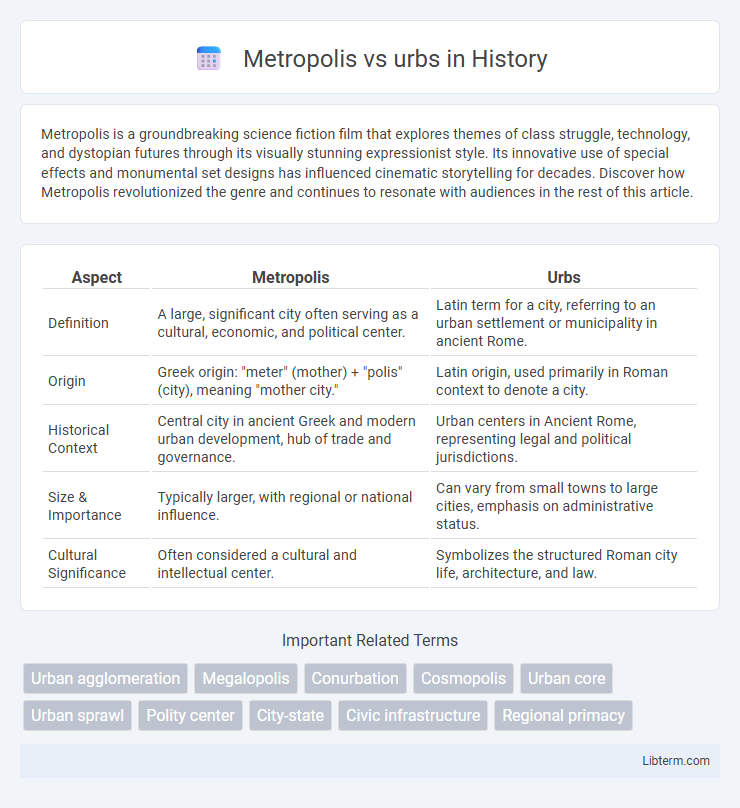Metropolis is a groundbreaking science fiction film that explores themes of class struggle, technology, and dystopian futures through its visually stunning expressionist style. Its innovative use of special effects and monumental set designs has influenced cinematic storytelling for decades. Discover how Metropolis revolutionized the genre and continues to resonate with audiences in the rest of this article.
Table of Comparison
| Aspect | Metropolis | Urbs |
|---|---|---|
| Definition | A large, significant city often serving as a cultural, economic, and political center. | Latin term for a city, referring to an urban settlement or municipality in ancient Rome. |
| Origin | Greek origin: "meter" (mother) + "polis" (city), meaning "mother city." | Latin origin, used primarily in Roman context to denote a city. |
| Historical Context | Central city in ancient Greek and modern urban development, hub of trade and governance. | Urban centers in Ancient Rome, representing legal and political jurisdictions. |
| Size & Importance | Typically larger, with regional or national influence. | Can vary from small towns to large cities, emphasis on administrative status. |
| Cultural Significance | Often considered a cultural and intellectual center. | Symbolizes the structured Roman city life, architecture, and law. |
Defining Metropolis and Urbs: Key Differences
A metropolis is a large, densely populated urban area that serves as a significant economic, cultural, and political hub, often encompassing multiple municipalities and metropolitan regions. Urbs refers to a city or town in general, characterized by defined administrative boundaries and urban infrastructure but on a smaller scale compared to a metropolis. The key differences lie in size, influence, and complexity, with a metropolis having broader regional impact and more extensive urban development than an urbs.
Historical Evolution of Metropolis and Urbs
The historical evolution of "urbs" traces its origins to ancient Rome, where it specifically referred to the city of Rome itself, embodying the administrative and cultural heart of the empire. In contrast, "metropolis" emerged in classical Greek, originally meaning "mother city," and evolved to describe large, influential urban centers that maintain political and economic dominance over surrounding regions. Over time, the concept of metropolis expanded globally, representing sprawling urban hubs characterized by extensive infrastructure, diverse populations, and significant metropolitan governance structures beyond the singular civic identity of the urbs.
Population Dynamics: Density and Diversity
Metropolis exhibits significantly higher population density compared to urbs, with inhabitants often exceeding millions concentrated in compact urban spaces, driving complex social interactions and infrastructural demands. The demographic composition in a metropolis is markedly diverse, encompassing numerous ethnicities, languages, and socioeconomic backgrounds, fostering a vibrant cultural mosaic. Conversely, urbs generally features lower density and less demographic heterogeneity, resulting in more homogeneous community structures and localized social networks.
Economic Structures and Opportunities
Metropolis typically features diverse economic structures with advanced industries, financial institutions, and global trade networks fostering robust economic opportunities. Urbs, often smaller and historically focused, centers around localized trade, artisanal production, and agricultural economies with more limited economic diversification. The scale and complexity of economic activities in a metropolis create greater employment prospects and innovation potential compared to the more traditional and community-based economic models in an urbs.
Urban Planning and Infrastructure
Metropolis refers to a large, densely populated urban area characterized by extensive infrastructure, complex transportation networks, and diverse land use planning, often serving as a major economic and cultural hub. Urbs, in urban planning context, typically denotes a smaller, more compact urban settlement with simpler infrastructure and a more localized land use strategy focused on residential and community needs. Effective urban planning in a metropolis involves managing high-density growth, multi-modal transit systems, and sustainable resource distribution, whereas planning in an urbs emphasizes maintaining livability and optimizing limited public services.
Social and Cultural Landscapes
Metropolis and urbs represent distinct social and cultural landscapes, where a metropolis typically embodies a complex, diverse population with dynamic cultural expressions and global interconnectedness. The urbs, rooted in historical and traditional urban forms, emphasizes communal identities, localized customs, and social cohesion within a more confined, often homogeneous environment. These differences shape urban experiences, influencing social structures, cultural practices, and patterns of interaction unique to each urban type.
Transportation Networks and Mobility
Metropolises feature extensive, multi-modal transportation networks integrating subways, buses, and commuter rails to support high-density mobility. Urban transportation in metropolises prioritizes connectivity, reducing travel time across large metropolitan areas through transit hubs and efficient routing. In contrast, urbs typically rely on more localized transport options with less extensive infrastructure and lower capacity for high-frequency mobility demands.
Environmental Impact and Sustainability
Metropolises generate significant environmental impacts due to high population density and extensive infrastructure, resulting in elevated carbon emissions, pollution, and resource consumption. Urban centers (urbs) tend to have smaller ecological footprints with more manageable waste and energy demands, allowing for localized sustainability initiatives. Implementing green spaces, efficient public transportation, and renewable energy solutions in both metropolises and urbs is essential to mitigate environmental challenges and promote sustainable urban development.
Governance and Administrative Challenges
Metropolises face complex governance challenges due to their extensive administrative divisions and higher population density, requiring multi-tiered government structures to manage services effectively. Urbs often have simpler administrative frameworks, allowing more centralized decision-making but may struggle with limited resources and scalability. Both entity types must address coordination between local and regional authorities to optimize urban planning and public service delivery.
Future Trends: Urban Growth and Transformation
Metropolis areas are expected to experience rapid urban growth driven by advanced infrastructure, smart city technologies, and increased economic activity, while urbs tend to grow more gradually, focusing on preservation of historical and cultural identity. Future trends indicate that metropolises will transform through digital integration, sustainable development, and high-density living solutions, supporting diverse populations and complex transit networks. Urban planners emphasize adaptive strategies in metropolises to manage environmental impact and resource efficiency, contrasting with urbs' efforts to balance modernization with maintaining traditional urban forms.
Metropolis Infographic

 libterm.com
libterm.com